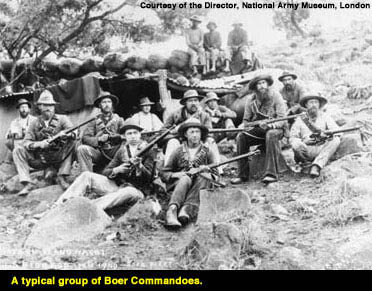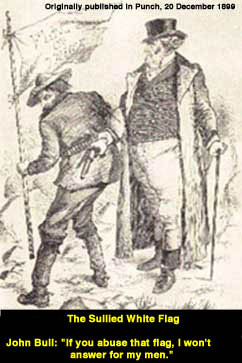“To Be Born An Englishman Is To Win First Prize In God’s Lottery”
 Darwin’s recent Origin of the Species proffered the theory that a superior race had a moral obligation to educate and civilise less advanced races for their own betterment. This only provided further credence to the primary belief of Imperialists in Britain: that from the Crusades onwards, the Englishman had been entrusted with the God-given duty to convert the heathen races of the world to his model of internal order and morality. In 1899, the Spectator concluded that, “The duty of the white man is to conquer and control, probably for a couple of centuries, all the dark people of the world, not for his own good, but for theirs.” The racial attitudes expressed are offensive to the modern reader, but at the time the White Man’s Burden was the responsibility of every good Christian. The Church of England’s stance on the war was pro-government, declaring it to be a war against injustice. Some of the smaller, non-conformist groups voiced their disapproval, and attracted some of those disenchanted with the actions of the majority to their cause. The Quakers were very active in campaigning against the war.
Darwin’s recent Origin of the Species proffered the theory that a superior race had a moral obligation to educate and civilise less advanced races for their own betterment. This only provided further credence to the primary belief of Imperialists in Britain: that from the Crusades onwards, the Englishman had been entrusted with the God-given duty to convert the heathen races of the world to his model of internal order and morality. In 1899, the Spectator concluded that, “The duty of the white man is to conquer and control, probably for a couple of centuries, all the dark people of the world, not for his own good, but for theirs.” The racial attitudes expressed are offensive to the modern reader, but at the time the White Man’s Burden was the responsibility of every good Christian. The Church of England’s stance on the war was pro-government, declaring it to be a war against injustice. Some of the smaller, non-conformist groups voiced their disapproval, and attracted some of those disenchanted with the actions of the majority to their cause. The Quakers were very active in campaigning against the war.
One of the few dissenting voices was J.A. Hobson. He argued that financial gain rather than Christian ideals motivated these Crusaders. Far from helping the less fortunate, Imperialists were exploiting them. The industrial development of Europe had left the market saturated, and it had become essential to find new areas of investment. This had caused the rush among the major powers to divide Africa between them to create new markets. He considered the Uitlanders’ struggle for rights, like the Jameson Raid, was one of many premeditated incidents to engineer a war in South Africa, enabling Rhodes and other capitalists to gain control of the gold mines for Britain’s benefit. Hobson’s views gained more supporters as the war went on.
Attitudes to the Boers
 Debate raged over the legitimacy of war. If the guiding force behind Imperialism was Christianity, how could military force be justified? How could a nation purporting to be civilised wage war on it’s own kind? The idea that a huge army should be used against a much smaller and less well armed foe was unsporting. Chamberlain and the right-wing press pointed to Kruger’s ultimatum as proof that the Boers were the aggressors, but many were unconvinced. Perhaps to make themselves more comfortable with the war, many questioned whether the Boers could be classified as a civilised race. Certainly, they had migrated from Europe, but to the modern Victorian their life of the Bible and the gun seemed like a remnant from a bygone age.
Debate raged over the legitimacy of war. If the guiding force behind Imperialism was Christianity, how could military force be justified? How could a nation purporting to be civilised wage war on it’s own kind? The idea that a huge army should be used against a much smaller and less well armed foe was unsporting. Chamberlain and the right-wing press pointed to Kruger’s ultimatum as proof that the Boers were the aggressors, but many were unconvinced. Perhaps to make themselves more comfortable with the war, many questioned whether the Boers could be classified as a civilised race. Certainly, they had migrated from Europe, but to the modern Victorian their life of the Bible and the gun seemed like a remnant from a bygone age.
The Boer army was based on the commando system, non-professional burghers divided into small, highly mobile groups. There was no uniform or regimentation, just a horse, rifle and a minimum of supplies for each man. In the field the officers did not set themselves apart from the lower ranks. This lack of social distinction was unheard of on the British side, and convinced many of the “uncivilised” argument. The Empire had been built on the myth of the Public School Warrior, the officer who persuades lesser men to perform above themselves through his inspired leadership and great courage.
A Civilised War?
 The 1899 Hague Peace Conference had been set up at the behest of the Czar to find a way to put an end to the arms race that had consumed the Great Powers since 1870. While there was no official legislati0n passed, it was the first time that nations had got together to agree on military conventions. For the first time the Red Cross Convention of 1864 was ratified, and the use of dum-dum bullets and chemical weapons were outlawed. Mediation from neutral countries to prevent war was the major outcome of the conference, but could not be enforced upon nations intent on war.
The 1899 Hague Peace Conference had been set up at the behest of the Czar to find a way to put an end to the arms race that had consumed the Great Powers since 1870. While there was no official legislati0n passed, it was the first time that nations had got together to agree on military conventions. For the first time the Red Cross Convention of 1864 was ratified, and the use of dum-dum bullets and chemical weapons were outlawed. Mediation from neutral countries to prevent war was the major outcome of the conference, but could not be enforced upon nations intent on war.
The campaign has often been characterised as a White Man’s War and while there was no official agreement, both sides were reluctant to use Native forces in battle. Boer law prevented Natives carrying firearms and they feared the problems that could be caused by arming them. The British were aware that the question of colour was a sensitive issue, and prevented eager Indian or Maori troops from joining the forces in South Africa. There was also the question over whether the natives could be controlled. A statement from the cabinet in Natal pointed out that even if ordered by Europeans it would be impossible to restrain the natives and keep them under control in accordance with the usages of civilised warfare.” The Black population were keen to help the British as they believed that victory would provide them with the same rights that the Uitlanders would receive. They were used as scouts, spies and messengers at first, by the campaign end there were reckoned to be 30,000 drafted in to serve as soldiers, a source of much Boer complaint.
From the very start the British were made aware that the old traditions no longer applied. The bright red coats of the past had been replaced by khaki, the cavalry were barely employed, and the traditional tactics failed against an intelligent and resourceful enemy exploiting the terrain to their advantage. The smokeless rifle magazine had turned the advantage from all out attack to defence. The Boers could shoot at their targets in relative safety without a puff of rifle smoke giving away their location. One bewildered soldier likened it to fighting an army of ghosts. There was an especially high toll of deaths among officers. The Boers could easily pick out those who wore glittering badges of rank, and the Public School Warrior was eventually forced to dress down like the rest of the men.
In the heat of battle, the rules of fair play were often forgotten. At the Battle of Elaandslaagte one set of commandos raised a flag of surrender, but when the British came into the open to take prisoners, another group opened fire. At Spion Kop a similar incident occurred when British troops fired on Boers who had come to collect their dead. There were also accusations from both sides that their opponents used dum-dum bullets, usually reserved for elephants, on their enemy. The bullets had been used on native dervishes in previous battles because the natives had managed to continue fighting even after being struck by an ordinary round. The fact that this ammunition was used on fellow whites caused some controversy when it emerged.
“Methods of Barbarism”
Sir Henry Campbell-Bannerman’s famous statement, “When is a war not a war? When it is carried on by methods of barbarism in South Africa,” echoed the shame felt by the people of as news of the humanitarian disaster that was the concentration camp system. Joseph Chamberlain defended the disaster, stating that the concentration camp system had been the only humane alternative to leaving women and children on the veldt. In December 1900 Kitchener had extended the policy to include the women and children of husbands/fathers who were carrying on fighting in a bid to hasten the end of the war. The camps were unprepared for the huge number of people to be interred, and there were not enough tents, rations, medicine or adequate sanitation to cope. Twenty-eight thousand were estimated to have died, including twenty-two thousand children, from a total Boer population of two hundred thousand. At the camps reserved for native Africans fourteen thousand died. Kitchener maintained that the high death rate was related to the insanitary habits of the Boer inhabitants. While it was true that the ignorance and superstitions of the women became problematic when under confinement, the neglect from those charged with running the camps was the principal contributor to the disaster.
It was thanks to Emily Hobhouse of the SACC that the camps became public knowledge. She was one of a number of women from fairly well-to-do families who became involved in South Africa for humanitarian reasons. Hobhouse spent some months at the camps in the Orange River Colony nursing the sick and carefully examining the. On her return home she harassed several MPs into making her findings public. The nation that had spent centuries spreading civilisation and culture to the less fortunate was now in the position of trying to explain how it could allow such a terrible situation arise. In three years the whole myth of racial superiority on which Imperialist policy had been built crumbled. While it was by no means the end of the Empire, the war was the point at which people began to see it’s flaws.
Links:
Recommended reading:
Imperialism, J.A.Hobson